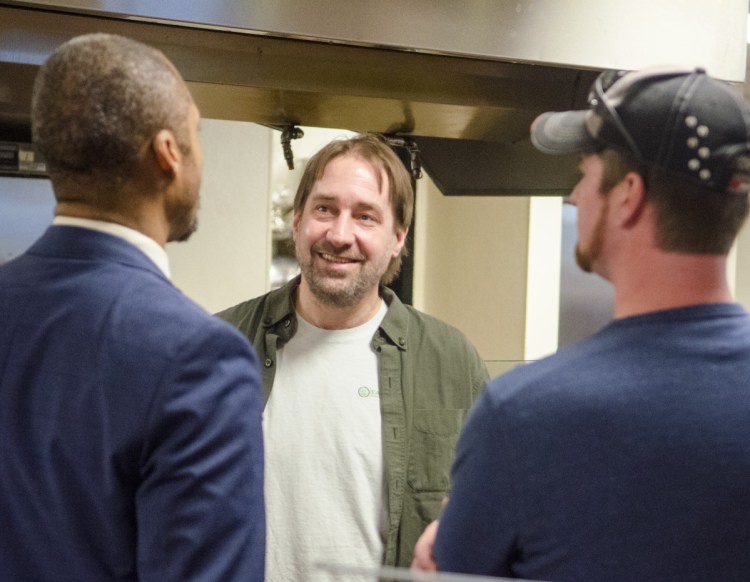AUGUSTA — As a diabetic and bilateral amputee, John Gillis relies on CBD, a derivative of the cannabis plant, to manage his constant pain.
The 30-year-old Dexter resident uses CBD-infused food, tinctures and lotion to control the pain, but he lost the right to buy all but the lotions since state health authorities started ordering businesses to remove oral CBD products from their shelves last month.
“I have a lot of chronic pains and aches,” Gillis said. “Tinctures help to ease a lot of my internal pains, headaches and migraines. … Without it, I’d be in constant pain, or taking opiates, which I absolutely refuse to do.”
Gillis was one of more than 100 people who attended a rally at the State House on Tuesday to protest the state removal order. The rally drew CBD users, hemp farmers, medical marijuana caregivers and retailers who use or earn a living from CBD products.
It also coincided with the introduction of a bill that would sideline the removal order, giving those stakeholders some breathing room while the Legislature works out a solution.
“These regulations diminish the livelihoods of our hemp farmers, food producers and retailers, hurt rural communities and deprive Maine people of the food they consider necessary for their own and their animals’ well-being,” said Democratic Rep. Craig Hickman, an organic farmer from Winthrop who co-chairs the state’s agriculture committee and introduced the bill.
Last month, state health authorities concluded that consumable food, tinctures and beverages containing cannabidiol, or “CBD,” can’t be sold to the general public because the hemp-derived compound is not a federally approved food additive.
The ruling threatens to derail Maine’s fast-growing hemp industry at a time farmers, extraction labs and retailers are investing millions of dollars as the CBD-only market here and across the country is poised for explosive growth.
The U.S. market hit $591 million in 2018, according to the Brightfield Group, a national industry analyst. With new federal legislation making non-psychotropic CBD distinct from marijuana, its intoxicating cannabis cousin, CBD sales could hit $22 billion by 2022, Brightfield said.
On Tuesday, while the CBD rally was occurring on the third floor of the State House, state officials were meeting to figure out a path forward that would save the state hemp industry and keep CBD-only products on store shelves despite the changing federal landscape, a spokesman for Gov. Janet Mills said.
“The administration recognizes the frustration and concern,” Scott Ogden said.
The answer may lie in emergency legislation that would make the sale of hemp-derived CBD legal in Maine, Ogden said. Hickman said his bill would do that, and that it has Mills’ support.
Hickman hopes to get a public hearing on the bill, L.D. 630, by the end of the month. He said the state order that has caused so much anxiety and confusion is based upon a federal agency that regulates interstate food commerce, not food products that stay within the state.
Dave Whitten, the owner of Sticky Bud Farms in Windham, hopes the state will reverse the CBD prohibition. As a caregiver, Whitten could still sell CBD to card-carrying patients.
But he also wants to keep selling his CBD dog biscuits.
“People walk into my store desperate for something to help their dog,” Whitten said Tuesday. “I have a CBD dog biscuit that does wonders for separation anxiety. People are skeptical at first – heck, I was skeptical of CBD at first, too – but it works wonders. Just ask my customers.”
CBD products aren’t going to disappear, however. Medical marijuana patients can still buy oral CBDs from licensed caregivers like Whitten or dispensaries, and businesses can still sell CBD that can be smoked, vaped, worn as a patch or applied as a lotion. Because the federal government considers cannabis illegal, there has been no testing or regulation of CBD products, leaving many consumers to use trial and error to find the right product for their ailments.
Though Gillis says he needs more than just CBD lotions to control his pain, he doesn’t want to get his medical card because he doesn’t want to end up on a list of cannabis users or give up his right to carry a firearm, something cannabis users don’t have.
“There’s still a stigma,” Gillis said. “I need something that works, but I don’t want to get labeled.”
Penelope Overton can be contacted at 791-6463 or at:
poverton@pressherald.com
Send questions/comments to the editors.




Success. Please wait for the page to reload. If the page does not reload within 5 seconds, please refresh the page.
Enter your email and password to access comments.
Hi, to comment on stories you must . This profile is in addition to your subscription and website login.
Already have a commenting profile? .
Invalid username/password.
Please check your email to confirm and complete your registration.
Only subscribers are eligible to post comments. Please subscribe or login first for digital access. Here’s why.
Use the form below to reset your password. When you've submitted your account email, we will send an email with a reset code.